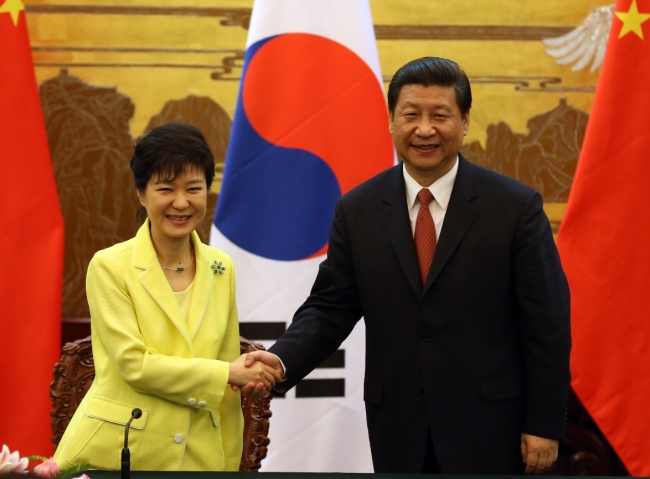
박근혜 대통령과 시진핑(習近平) 중국 공산당 총서기 겸 국가주석이 27일 정상회담에서 북한 비핵화와 경제•안보 교류 확대를 통한 양국 관계 강화에 의견을 모았다.
첫 정상회담에서 양 원수는 한중 미래 관계의 비전과 원칙을 포함한 공동 선언문을 채택했다. 선언문은 한반도 및 아시아 지역권의 긴장 해소에 협력한다는 내용이 포함되어 있다.
선언문을 통해 박 대통령과 시 수석은 ▲상호 이해와 신뢰, ▲미래 지향적 상호 협력, ▲평등원칙과 국제규범의 존중 ▲지역과 국제 사회의 평화, 안정 및 번영에 기여한다는 한중 관계의 4가지 원칙을 마련했다.
또한, 양 정상은 긴밀한 정상회담급 소통 창구를 구축하고, 다각화된 실무급 전략 대화를 마련하기로 합의했다. 인문•경제•사회 교류도 확장하는데 동의했다.
“과거 정상 회담이 포괄적인 키워드로 구성되었다면, 이번 선언문은 한중 관계를 한 단계 격상하는 구체적인 도안이다”고 김행 청와대 대변인이 설명했다.
한중 FTA 추진 또한 정상회담의 주요 현안이었다. 양국은 작년 5월에 FTA 협상을 개시해 현재 5차 협상을 마무리했다. 6차 협상은 7월 초에 열릴 예정이다.
정상회담 후 박 대통령과 시 주석은 한•중 청년 대표 100명과 만나 양국 관계를 발전하는데 기여하기를 독려했다.
또한, 두 정상은 무비자 입국, 무역, 해양 과학 기술, 에너지 보존 및 다양한 분야를 포괄하는 각종 협약 및 양해 각서 체결식에 임석했다.
박 대통령은 이날 시 수석이 인민 대회당에서 주최한 저녁 만찬에 참가하며 일정을 마무리 했다. 만찬에는 양국 인사 140명이 참석했다.
박 대통령은 금요일 리커창(李克强) 총리와 장더장(張德江) 전국인민대표회의(전인대) 상무위원장과 만나 양국간 관계를 내실화하는 방안을 모색한다. 방중 동안 한중 비즈니스 포럼에서 연설하고 현지 대학교를 방문해 중국어로 연설할 계획이다. 현지에 진출한 우리 기업도 방문한다.
이튿날 박 대통령은 중국 서부 산시성(陝西省)의 성도인 시안(西安)을 방문한다. 시안은 역대 왕조의 도읍으로 3000년 역사를 자랑하는 고도이자 중국 정부가 지난 2000년부터 추진 해온 ‘서부 대개발’ 사업의 거점도시이다. 시안은 중앙 아시아와 유럽으로 진출하는 발판으로 큰 잠재력을 품고 있다.
박 대통령은 이날 산시성 대표자들과 면담해 양국간 경제 협력 및 교류를 확대할 방안을 토론한다. 또한 현지에 진출한 우리 기업을 방문하고, 유적지를 탐방한다고 청와대 관계자가 전했다. (코리아 헤럴드 이주희 기자/ 번역 이상주 인턴)
<관련 영어 기사>
Park, Xi vow closer cooperation on N.K.
Leaders agree on stronger strategic partnership on region, economy
By Lee Joo-hee and news reports
President Park Geun-hye and Chinese leader Xi Jinping on Thursday vowed to closely cooperate on North Korea’s nuclear problem and bolster bilateral ties with diversified security dialogue and mutually beneficial economic exchanges.
In their first summit, they adopted a joint communiqué containing the future direction and principles of the two countries’ relations and ways to solidify their cooperative partnership.
The statement also included their pledge to work together on solving the tension on the Korean Peninsula and on other regional and international matters.
Park arrived in Beijing in the afternoon for her four-day state visit.
She has been aiming to win support from Beijing in persuading the reclusive North to abandon its nuclear weapons and become a responsible member of the international community, by highlighting the vital role of China that remains the biggest influencer of Pyongyang.
China, which has long prioritized stability in the North as its largest economic provider, has taken sterner actions since Pyongyang’s defiant nuclear test in February that rose concerns of a potential regional arms race.
China has since backed U.N. sanctions and joined separate U.S. sanctions by suspending all transactions with the North’s Foreign Trade Bank.
Hopes for a breakthrough have been rising as diplomats of the countries of the six-party talks boost communication with each other, with North Korea making gestures for dialogue. But South Korea has so far remained pessimistic about the sincerity of Pyongyang’s overtures.
In their statement, Park and Xi highlighted four principles in Sino-South Korean relations: better mutual understanding and trust; stronger future-oriented mutual cooperation; egalitarian principles and respect for international regulations; and contribution to the regional and international communities’ peace, stability and prosperity.
The two leaders also agreed to establish close summit-level communication channels and diversified and intermediate-level strategic dialogue. Exchanges in the liberal arts, economic and social sectors will also be promoted.
“If the past summit talks consisted of comprehensive key words (for the two countries’ futures), the statement (between Park and Xi) encompasses a detailed blueprint to develop and upgrade the Korea-China relations,” said Kim Haing, presidential spokeswoman.
Encouraging progress toward a free trade deal was also a key agenda of their talks. Seoul and Beijing launched official negotiations in May last year to tear down barriers in trade between the two countries. So far, the two sides have held five rounds of talks, and a sixth round is scheduled for early July.
After the summit talks, Park and Xi greeted about 100 student and youth representatives of Korea and China to encourage their roles in expanding bilateral relations.
The two leaders then oversaw the signing of several agreements and memorandums of understanding including on diplomatic visa exemption, trade, marine science technology, energy conservation and R&D on application technology.
The two wrapped their schedule with a dinner hosted by Xi at the Great Hall of the People, joined by 140 Korean and Chinese participants.
On Friday, Park will meet one-on-one with two other top Chinese leaders, Premier Li Keqiang and Zhang Dejiang, chairman of the Standing Committee of the National People‘s Congress, to talk about ways to strengthen relations between the two countries.
Her visit to Beijing also includes an address at a forum of business leaders from the two countries, a speech in Chinese at a university in Beijing and a tour of South Korean firms operating in China.
On Saturday, Park flies to the western Chinese city of Xian.
Xian, an ancient capital with more than 3,000 years of history, is a base for China’s push to develop the western part of the country and is seen as having great potential as a foothold for South Korean firms trying to expand to Central Asia and Europe.
While there, Park plans to meet with leaders of the Shaanxi province for discussions on ways to increase economic cooperation and other ties between the two sides. She also plans to visit South Korean companies and cultural sites there, officials said.
A record 71 business leaders are accompanying Park on her China trip. (jhl@heraldcorp.com)


















